Railway
Lagos to Ibadan rail: Proof of pudding is in the eating
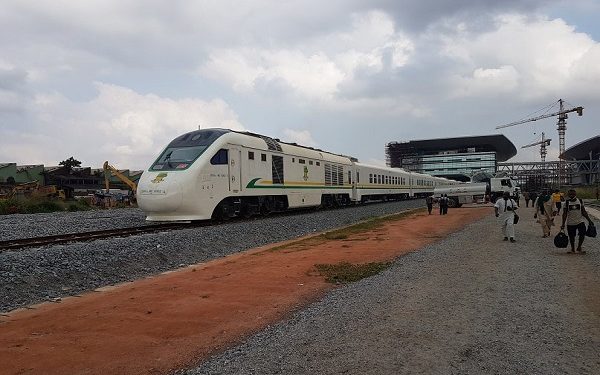
Life is gradually returning to the rail track leading from Lagos to Ibadan, the Oyo State capital. PAUL ADE-ADELEYE shares his experience
After much talk, some animosity and a burst of determination, the Lagos to Ibadan rail line finally kicked off activities low-key on December 7. Although its maiden trip was mocked for recording generally low patronage, the fault did not lie with the quality of service on offer; neither did it lie, contrary to popular opinion, with the fare of commuting. A return journey to and from Ibadan last week Wednesday, turned out to be exhilarating.

- Train host/hostesses
Everyone has said it, so it is no secret that none of the train stations on the 156km route is complete at the moment. The closest to completion is the Lagos terminal at Ebute Metta in Lagos Mainland. When completed, the terminal has been touted to match international standards. A cursory glance at the level of work ongoing at the station seems to point to the absence of any fib on the part of those who believe that the new terminal will be of high quality. Awaiting the comfort of the new terminal, however, Lagos District Manager of the Nigeria Railway Corporation (NRC), Jerry Oche, took it upon himself to ensure that travellers were well treated.
Inviting the first five travellers to arrive at the Lagos Station to the conference room of the old terminal last Wednesday, the manager fielded questions and even served drinks, apologising that the waiting area and ticketing booth were not ready. One traveller wondered aloud why there was little publicity concerning how the train would work, especially as most travellers simply had to grope their way through the procedure leading up to boarding the train. Mr Oche, an engineer, however, revealed that the absence of fanfare and advertorial that would serve as official publicity for the commencement of the train service was deliberate.
Officially, the train service has not been commissioned. This will be done by President Buhari sometime in January by which time it is hoped the project would have been completed. Meanwhile, the bit-part launching of the train service means that with current operations, the train can sit as many as 580 people. At the moment, especially since the station is not completely ready and there is no secure waiting area, it may be difficult to manage such a number. Oche is reluctant to kick-start operations at full capacity when the facilities to manage such numbers are not yet completely available. For now, he appears content to let the train service announce itself, a strategy that appears to be yielding dividends.
The district manager is additionally confident that this can be a successful strategy because the train service had conducted a free trial from Iju to Ibadan and only the COVID-19 pandemic stopped the service. When the trial started, they recorded low turnout but soon the numbers skyrocketed and maximum patronage was recorded at every journey.
Facilities
The reporter arrived at the train station with the intent of travelling humbly. Humility must be understood to mean economy class. However, when the booking clerk would ask what class of commuting the reporter wanted, a strange whim caused the reporter to opt for first class.
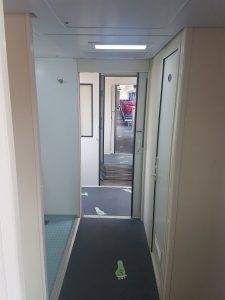
- The passage
The first-class coach, which seats 24 passengers, costs N6,000; the business class coach, which seats 56 passengers, costs N5,000; while the economy coaches cost N3,000 for the 68-seater coach and N2, 000 for the 88-seater coach.
Luxury is an addictive spirit, so let it suffice to say that the return journey was first class also. Whatever the financial effects of this deluxe treatment of self, the devil may care but the reporter does not. To purchase a train ticket, the prospective commuter must present some form of identification – no doubt for security purposes.
Despite the incompleteness of the rail station, the manager was keen on security. He mandated that only travellers were to be on the ramp leading up to the train during boarding hours. There are also contracted security personnel belonging to several paramilitary bodies who embark on every train ride for the safety of the passengers. No staffer without business on the train was to be in the vicinity. At the entrance of the train, courteous staff (a welcome improvement in Nigeria) greeted the passengers, and the train not to be outdone, also breathed a cheeky draught of cold air. The trip, this implied, would be fully air-conditioned. The train was not complaining, the employees were not, and the passengers certainly were not. That consensus being reached, the reporter did not begrudge the train hostess leading him to the first class session – he paid for it anyway. There were sinks on the train, restrooms and a mini-bar from which nourishment was to be served for the pleasure of travellers.
Cross-checking this array of amenities with a contact in the United Kingdom confirmed that the regular metro trains do not offer this luxury. Only the long-distance trains, which operate between counties, do. While the economy and business class carriages looked comfortable enough, the reporter cannot say much for them, having only passed through. The first-class coach, however, was what it promised. The seats had trays, which could be summoned or neatly tucked away according to the traveller’s preference. The seats could also be rotated a full 360 degrees should the traveller not enjoy the sensation of being in reverse as the train rolls along. Trains, you see, hardly turn. There are engines at both ends, which propel the train depending on the train’s direction, and so the traveller is either travelling backward or forward.
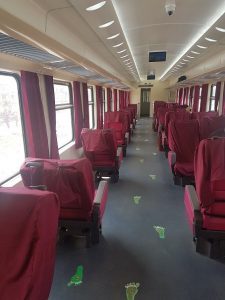
- Interior of the First Class coach
At exactly 4 pm, the train departed the station. The passengers had been warned that the trip would last 2:41 hours. There are stations in Agege, Alagbado, Kajola, Abeokuta, Papalanto, Olodo, Omi Adio and finally Moniya, Ibadan, but for now, only the Abeokuta station is a stopping station. The stop was for only five minutes, and, as promised, at exactly 6:41, the train rolled into the Ibadan station. Similarly, the next morning, the train departed Ibadan by exactly 8 am and was in Ebute Metta at exactly 10:41 am. At maximum speed, the train is expected to eat up the distance at the rate of 150km/hr. The precision was encouraging for it meant a fellow could work his schedule around the train schedule. Mr Oche noted that when the train service became fully operational, it could make as many as 16 trips daily with a train departing and arriving every other hour. The journey could have been shorter, but people trading on the rail lines have forced the train to virtually crawl through Lagos, picking up speed from Alagbado station.
Verdict
For the current prices, the Lagos-Ibadan rail service is worth the expenditure. As noted by many analysts, the advantages floor whatever financial inconvenience the traveller may experience. For N2,500, the commuter who has chosen economy class will get more than double the comfort that a traveller by road would hope to enjoy in public transport. The traveller again enjoys additional guarantee that they will arrive at their destination in one piece and at a pre-arranged time. The business class traveller, for only N5,000, will enjoy more exclusivity and can make use of a laptop or other such device as may be reasonably sized for their work. It is presumed that the first-class passenger has called congress in his mind and deliberated on what premium can be placed on comfort and luxury in travelling. Honeymooners or those who do not like crowded spaces are advised to travel first class. It offers comforts that even luxurious private vehicles struggle to match.
The fear, as with many other things in Nigeria, is the maintenance culture. It was lack of proper maintenance and farsightedness that led to the decline of the railway system which the British bequeathed. The NRC must be careful not to rest on its oars but seek new and better ways to innovate rail travel, for only by so doing can the current pace be sustained and evenly matched. The District Manager predicts that by February, the stations will be completed. It is difficult to see how that is possible.
-The Nation
Railway
Lagos Rail Mass Transit part of FG free train ride – NRC

Lagos Rail Mass Transit part of FG free train ride – NRC
The Nigerian Railway Corporation (NRC) has disclosed that the Lagos Rail Mass Transit (LRMT) trains are included in the Federal Government’s free train ride initiative for the Christmas and New Year celebrations.
The LRMT, which currently includes the Phase 1 Blue Line Rail and the Phase 1 of the Red Line Rail, operates under the Lagos Metropolitan Area Transport Authority (LAMATA).
This announcement was made by Ben Iloanusi, the Acting Managing Director of the NRC, during an interview on NTA News TV on Friday, following the launch of the initiative earlier that day.
While Iloanusi stated that Phase 1 of both the Blue Line and Red Line Rail projects are part of the program, LAMATA has yet to confirm this inclusion.
READ ALSO:
- Nigeria denies alleged plot to destabilise Niger Republic
- Navy arrests 19 Nigerians attempting to reach Europe by hiding on ship
- Troops arrest four Ambazonian rebels in Taraba
Iloanusi outlined the other routes benefiting from the scheme, which include the Lagos-Ibadan Train Service, Kaduna-Abuja Train Service, Warri-Itakpe Train Service, Port Harcourt-Aba Train Service, and the Bola Ahmed Tinubu Mass Transit in Lagos. Notably, little was previously known about the Bola Ahmed Tinubu Mass Transit service until this disclosure.
“Let me mention the routes where this free train service is happening. We have the Lagos-Ibadan Train Service, we have the Kaduna-Abuja Train Service, we have the Warri-Itakpe Train Service, we have the Lagos Rail Mass Transit trains, we have the Port Harcourt-Aba Train Service, and we have what we call the Bola Ahmed Tinubu Mass Transit, which is also in Lagos,” he stated.
Iloanusi provided operational updates, stating that passengers nationwide can access free tickets online or, for those unable to do so, at train stations where they will be profiled and validated.
He noted that passengers using NRC-managed services (excluding the Lagos Rail Mass Transit) should reserve tickets via the official website, www.nrc.gov.ng, with a valid ID required. He also advised travelers to plan, arrive on time, and bring valid identification.
Lagos Rail Mass Transit part of FG free train ride – NRC
Railway
NRC announces special Xmas, end-of-year train service

NRC announces special Xmas, end-of-year train service
The Nigerian Railway Corporation (NRC) says it will operate an end of the year special train service on all its routes across the country.
It announced this in a statement on Wednesday by its Deputy Director, Public Relations, Yakub Mahmood, saying it was in compliance with the Federal Government’s directive through the Federal Ministry of Transportation.
It however did not indicate if the special train service would be free or not.
The Federal Government last year similarly declared special train services for Christmas and New Year, which were made free for all users.
The statement added the modality for this year’s special service would be released soon.
The latest statement read, “The management of the Nigerian Railway Corporation (NRC), in compliance with the Federal Government’s directive through the Federal Ministry of Transportation, hereby informs the general public that the NRC shall operate end of the year special train services in commemoration of Christmas and New Year celebrations.
“This end-of-the-year special train service on scheduled passenger trains, is part of the government’s gesture towards an enjoyable end of the year celebration.
“Dates and modalities of the end-of-the-year Special Train Service shall be communicated in due course. We wish all our esteemed customers a Merry Christmas and a Happy New Year in advance.”
Railway
FG hands over $3bn Port Harcourt-Aba railway project to NRC
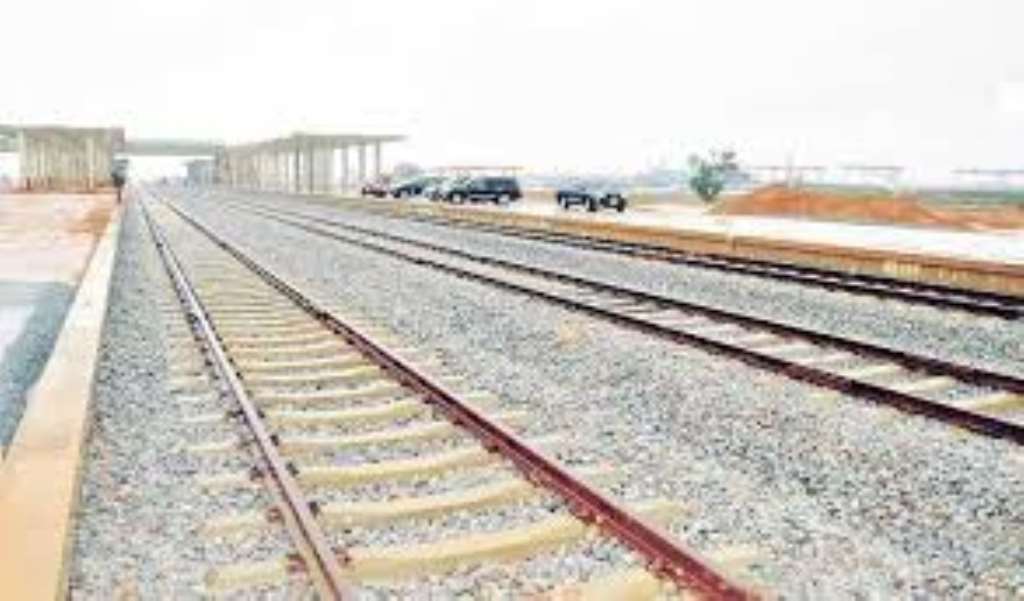
FG hands over $3bn Port Harcourt-Aba railway project to NRC
The 62-kilometre, $3.02 billion Port Harcourt-Aba railway project has been completed by Federal Government and handed over to the Nigerian Railway Corporation (NRC).
The Port Harcourt-Aba section is part of the larger Port Harcourt-Maiduguri eastern narrow gauge railway project, initiated under the administration of President Muhammadu Buhari.
The project supervisor, Federal Ministry of Transportation, Ayo Dada, formally transferred the railway to the NRC during a brief ceremony held on Thursday in Port Harcourt.
He said that the project, completed in May, had significantly improved passenger movement between Rivers and Abia, thereby enhancing their economies.
“The assets handed over include dismantled tracks measuring 283.060 km, rehabilitated and reconstructed 62.800 km of subgrade and the laying of 62.800 km of rail for the main line,” Dada said.
“This includes the laying of rail for sliding lines covering 5.690 km and the reconstruction of 27 sets of turnouts at Port Harcourt, Elelenwo, Obuzor, Umugo and Aba Stations, among others.”
Dada said that with the handover of the Port Harcourt–Aba section, the Federal Government would focus on the Port Harcourt–Maiduguri phase of the project.
READ ALSO:
- Naira appreciates to N1,740/$ in parallel market
- Reform Bills propose 55 per cent VAT revenue for states
- Nigeria ranks 4th among Africa’s most improved visa friendly nations
“The contractor has submitted the technical specifications and maintenance manual for the Port Harcourt–Aba section to the consultants.
“The ministry is committed to completing this project, which will foster national development,” he said.
The Managing Director of the NRC, Ben Iloanusi, commended the Federal Government and the ministry of transportation for the timely completion and transfer of the project.
Iloanusi, represented by the NRC Deputy Manager (Civil), Adesegun Ogunade, said that the railway had greatly benefited Nigerians seeking affordable transportation options.
“The rail line, now in operation, has started mitigating the impact of high transportation costs caused by economic challenges,” he said.
“Train services have been running for some time and passengers have reported that it has made commuting between Port Harcourt and Aba more convenient, faster and cheaper.
“People are already experiencing the benefits of this government’s policies and programmes.’’
He assured that the Port Harcourt–Maiduguri section would also be completed in due course, emphasising that adequate security arrangements had been made to ensure the safety of workers and passengers.
FG hands over $3bn Port Harcourt-Aba railway project to NRC
-

 Railway23 hours ago
Railway23 hours agoLagos Rail Mass Transit part of FG free train ride – NRC
-

 metro2 days ago
metro2 days agoCourt stops customs from seizing imported rice in open market
-

 metro3 days ago
metro3 days agoFG transfers electricity market regulatory oversight in Lagos to LASERC
-

 metro2 days ago
metro2 days agoIbadan stampede: Tinubu orders probe as death toll hits 40
-

 metro5 hours ago
metro5 hours agoWhy we displayed ‘Jesus Christ is not God’ banner at Lekki mosque -Imam
-

 metro1 day ago
metro1 day agoIbadan stampede: Ooni reacts after arrest of ex-wife
-

 metro2 days ago
metro2 days agoAfe Babalola: Court grants Dele Farotimi bail, barred from media interviews
-

 metro24 hours ago
metro24 hours agoNIMC warns against extortion, reaffirms free NIN enrollment



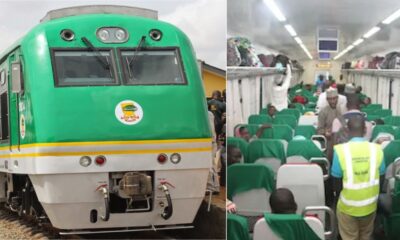

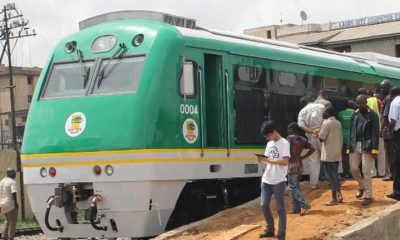




You must be logged in to post a comment Login